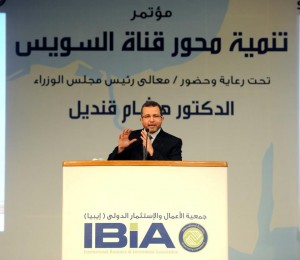
(Photo Cabinet Handout)
By Lamia Nabil
The Suez Canal Region Development Law is still at the draft stage and no official approval has yet been reached, said Prime Minister Hesham Qandil during his keynote address at the International Conference for the Suez Canal Regional Development Project on Monday.
“The Suez Canal Region Development law works on licensing and facilitating the establishment of new projects in the region under the existing investment laws,” he said. “The government is not seeking the introduction of new laws.”
He added: “No legislation will be approved or issued in secret.”
Qandil also denied that any agreements signed with specific states for contracts in the Suez Canal region would affect Egypt’s sovereignty. “The Suez Canal project is for Egypt and the Egyptian people,” he said.
Responding to rumours that the project will give countries like Qatar access to an Egyptian sovereign asset, Qandil said that “there will be no state within the state”.
Qandil also affirmed that the government took into consideration national security standards and recommendations from the military, and said that the tunnels under the Suez Canal will link the east and west of the region.
He added that the government’s priorities in the region were the areas of North and South Sinai and the three Canal governorates of Ismailia, Suez, and Port Said.
Qandil also said that both studies and comprehensive plans must be put in place for such national projects to avoid “repeating the former regime’s mistakes”.
“The Suez Canal region will be developed through establishing repair and supply centres for ships to raise revenues from $ 5.6bn yearly to $100bn yearly,” Qandil explained.
“Egypt’s population lives only on 6% of the country’s total land area, with the rest unused,” said Minister of Housing and Urban Communities Tariq Wafiq. “Most of this land is valid for development.”
Wafiq also added that the Suez Canal Development Law will not give the rights to own the project land to any investor, regardless of their nationality.
“The government also plans to develop the ‘Golden Triangle’ mining region, which contains the Sinai area,” he continued. “We aim to transform it into an international mining production zone.”
“It will cost EGP 18bn to start the mining production plan, the benefits of which will extend not only to the Sinai area but to Upper Egypt as well,” Wafiq added.
Wafiq confirmed that the armed forces have cleared landmines from 18,000 acres of land in Sinai, and the land delivered to the Ministry of Housing for development.
“The project will not be a new idea, as more than 15% of the project already exists,” said Waleed Abdel Ghafar, head of the technical secretariat of the Suez Canal Regional Development Project.
Ahmed Galal, the head of the International Business and Investment Association (IBIA), which organised the conference on Monday, announced the establishment of three coalitions and NGOs in the UK, the US and Saudi Arabia, in cooperation with IBIA and Egyptian businessman Hassan Malek in order to support the project and collect financial support from Egyptian workers abroad.




